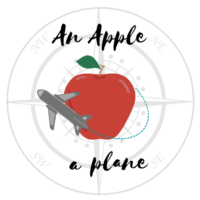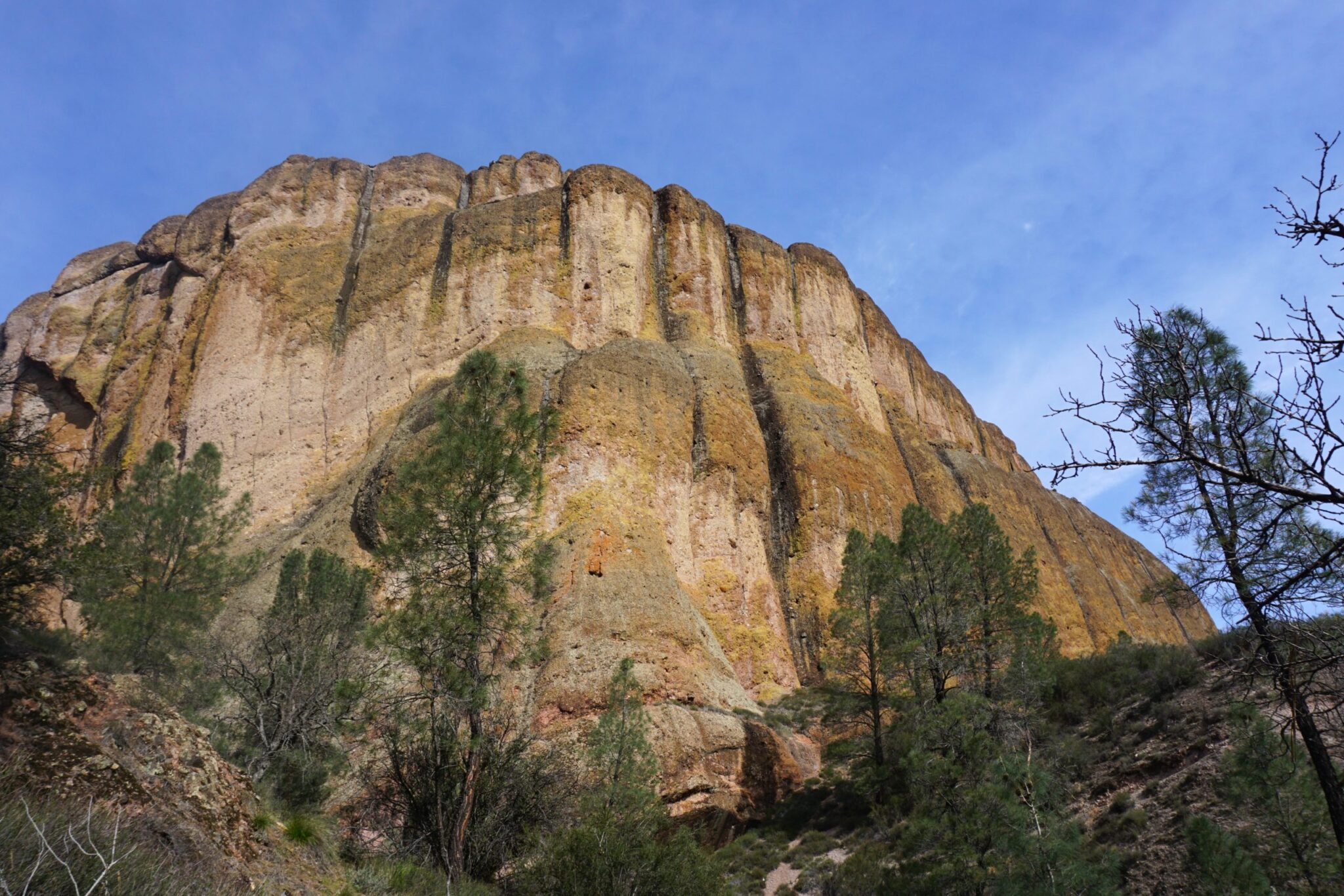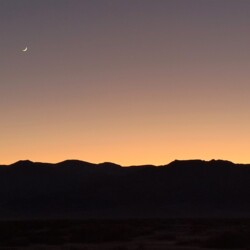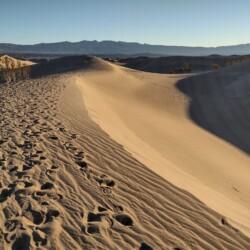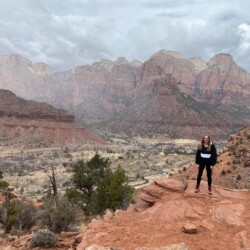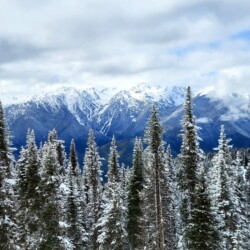Looking to explore Pinnacles National Park best hikes? This is the guide for you!
While Pinnacles National Park may be the smallest national park in California, there are only BIG reasons to visit. Like its famous rock spires, known as the high peaks! Or how about its rare talus cave formations? It’s even home to the California Condor.
Pinnacles became federally protected when it was declared a national monument in 1908. But this little park that could rose to higher fame over ONE HUNDRED years later! Pinnacles formally reached National Park status in 2013, followed by Gateway Arch in 2018 and Indiana Dunes in 2019.
Coming in at 7th smallest national park in the United States, get off the beaten path and explore this hidden treasure on your next California road trip or city break.
Pinnacles National Park Details
The most important thing to note when planning a Pinnacles National Park Trip is that Pinnacles is split into two different sides: west entrance and east entrance. And NO roads run through the park conneting the sides.
This means in order to get from one end of the park to the next, you either need to hike through, or drive AROUND the perimiter of the park (not recommended, this could take up to 3 hours)
If you are driving from Big Sur, Monterrey, or Carmel, plan to visit to the west entrance for a one hour drive. Dock on an additional two hours if you drive to the east entrance.
Location: Just over an hour from Monterey (northern most end of Big Sur), and just under 2 hours from San Francisco airport.
When to visit: On the weekends or holidays, plan to arrive by 9:00am. This could spare you from waiting hours for a parking spot. There is NO overflow parking at Pinnacles National Park, therefore rangers are carefully monitoring its small, limited parking lots.
Crowds peak at the end of winter and spring. According to a park ranger, Presidents Day weekend (when I visited) is their busiest weekend of the entire year. When I made my way out of the park by 12:00pm, there were at least 100 cars with a 1-2 hour wait.
Pinnacles National Park Weather: Spring is Pinnacles high season, followed behind winter and fall. But high season is subjective when we’re talking about the 7th smallest US national park, and this little one saw an average of 348,000 visitors in 2021. Compare this with over 5 million visitors at Zion the same year! Summer temperatures can be high and uncomfortable. Thankfully, there are places to tuck away for shade, but it does make this time of year low season.
How many days: Half day or full day. Taking a day trip to Pinnacles National Park is very doable from San Francisco or Monterrey.
Pinnacles National Park Hikes
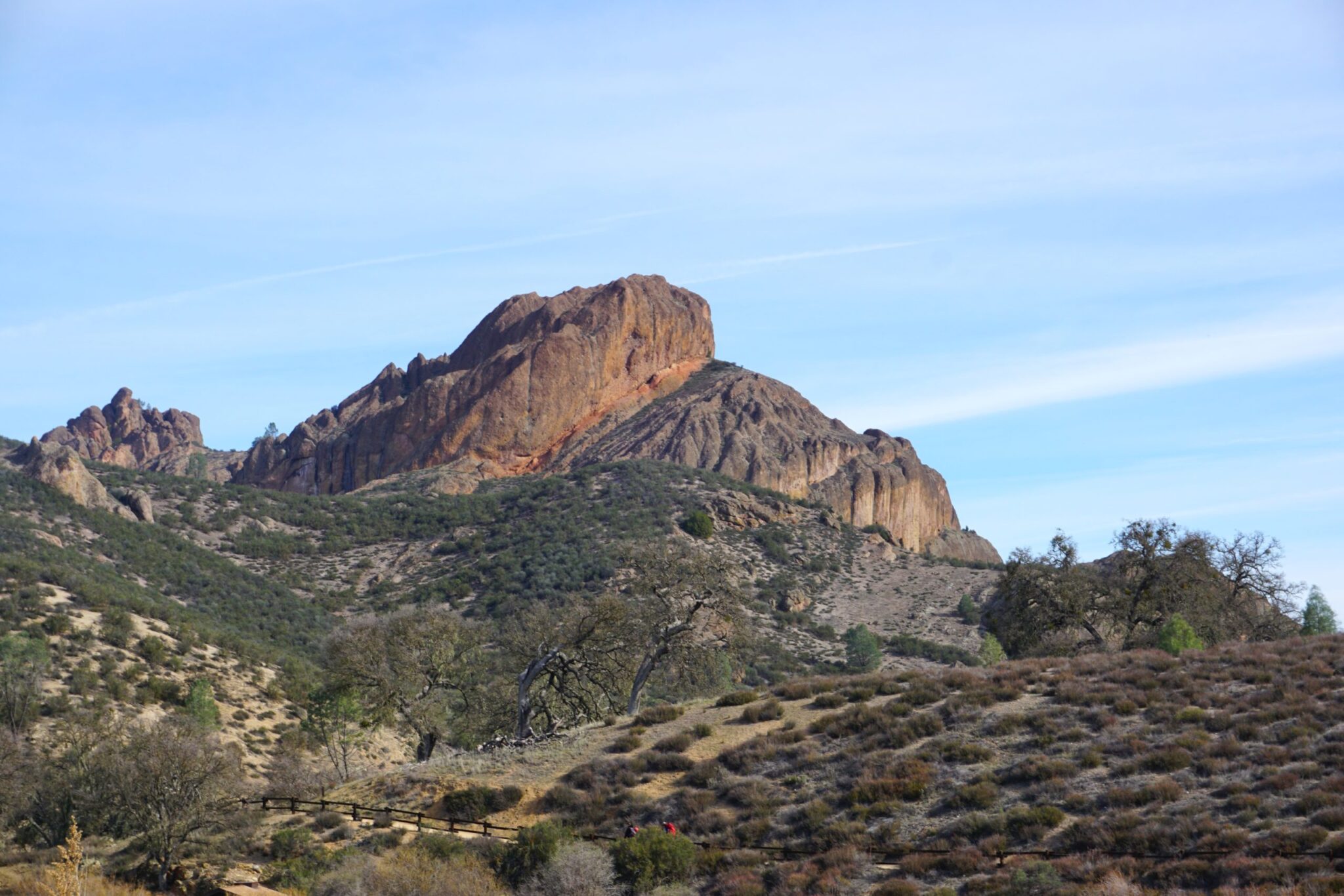
Hikers can explore more than 30 miles of Pinnacles National Park trails!
With near empty weekday lots but completely packed on spring weekends, it’s no wonder hikers and climbers alike bask in its beauty as a weekend destination.
I like to always check AllTrails to get an idea of my options, and talk with a park ranger when I arrive about specifics of the trail I am interested in (safety conditions for the day, best place to park, etc)
West Entrance Pinnacles National Park
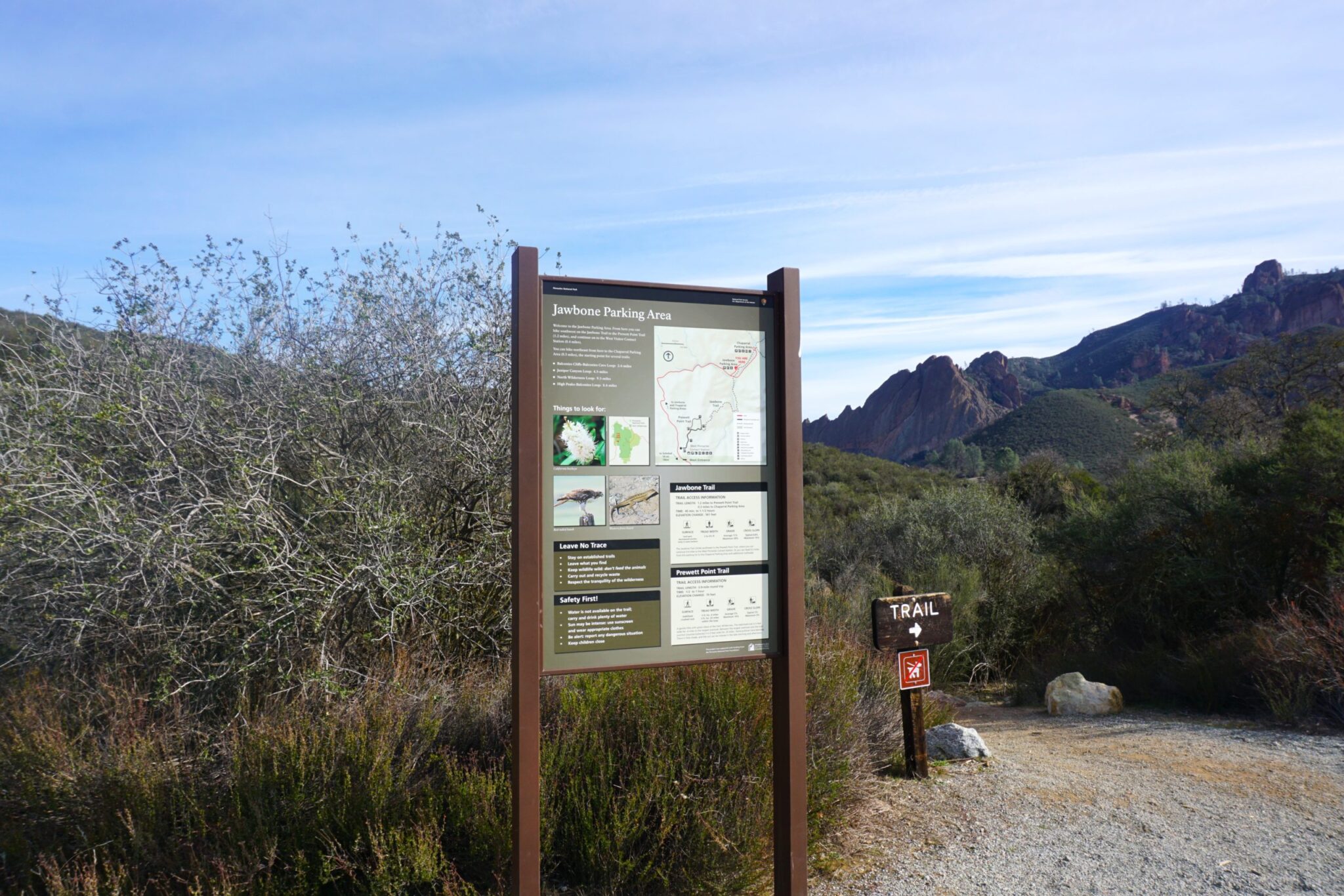
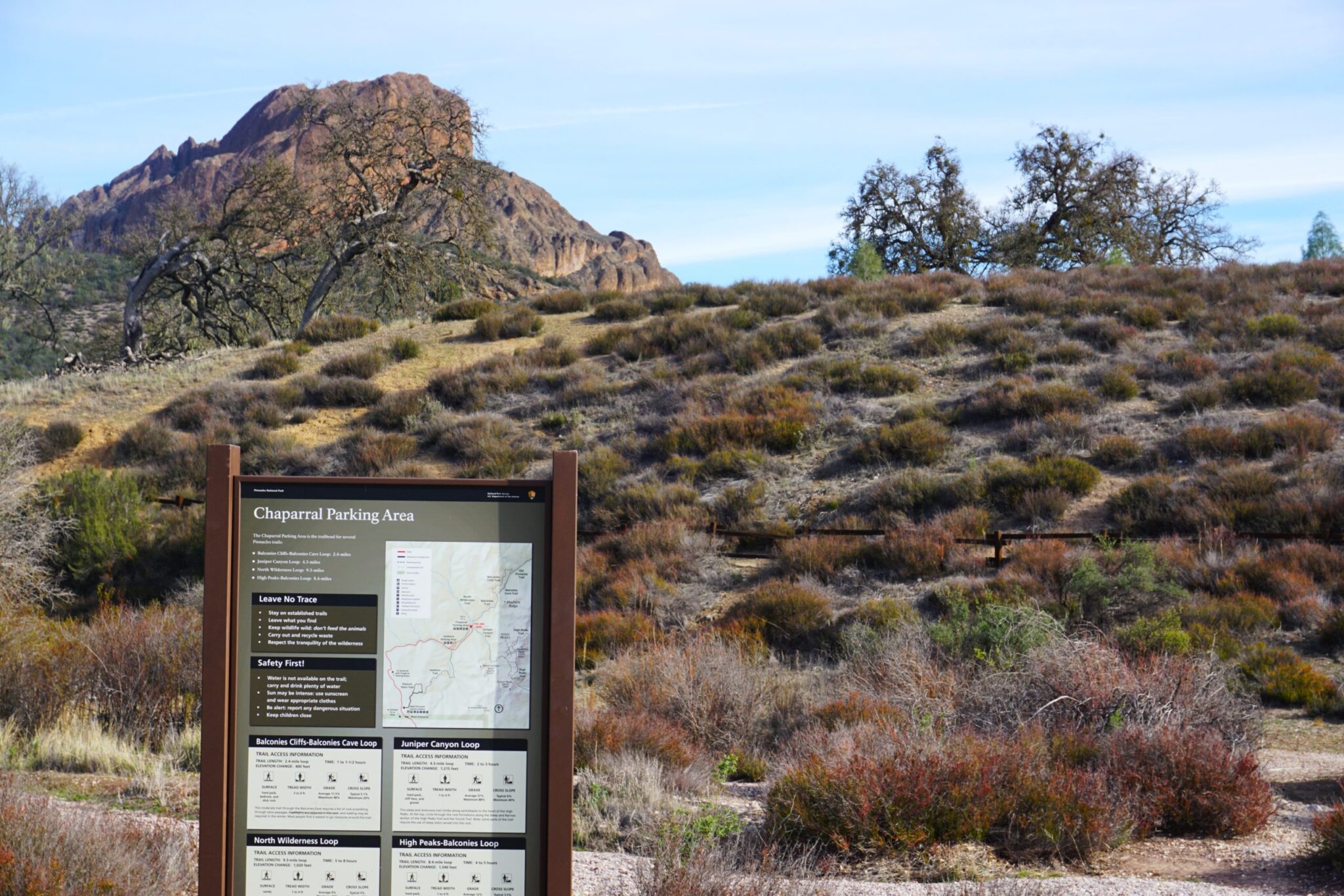
Jawbone and Chaparral are the two parking lots on the West entrance of Pinnacles National Park. A 10 minute hike from Jawbone brings you through Chaparral to the starting point of most west entrance hikes. There are several hiking options from here.
Balconies Cliffs – Balconies Cave Loop
Length: 2.4 miles
Elevation gain: 400ft
Juniper Canyon Loop
Length: 4.3 miles
Elevation gain: 1,215
North Wilderness Loop Trail
Length: 3 miles
Elevation gain: 1,020ft
High Peaks – Balconies Cave Loop
Length: 8.4 miles
Elevation gain:
Prewett Point Trail
Length: .9 miles
Elevation gain:
Jawbone Trail
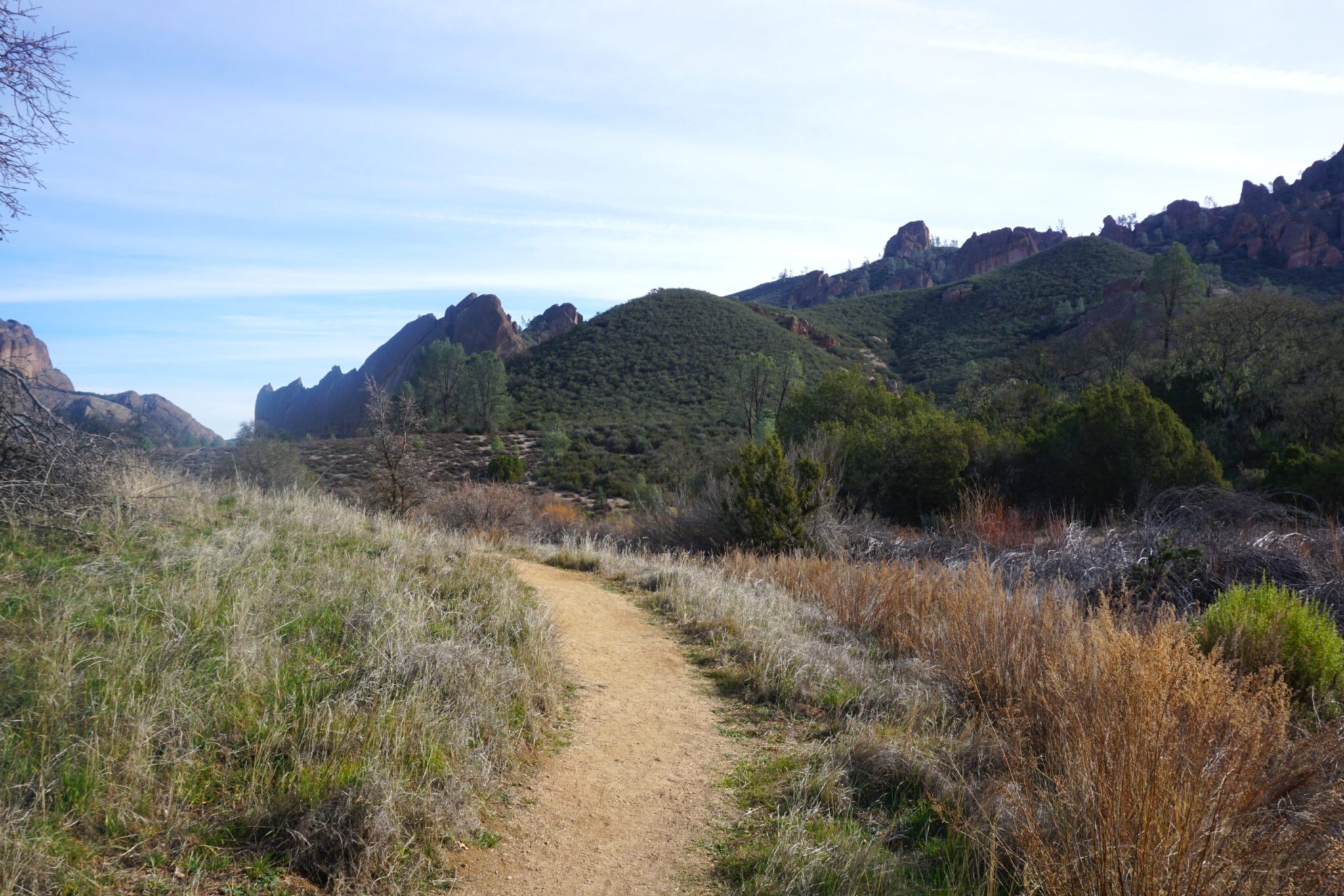
Length: 1.2 miles
Elevation gain:
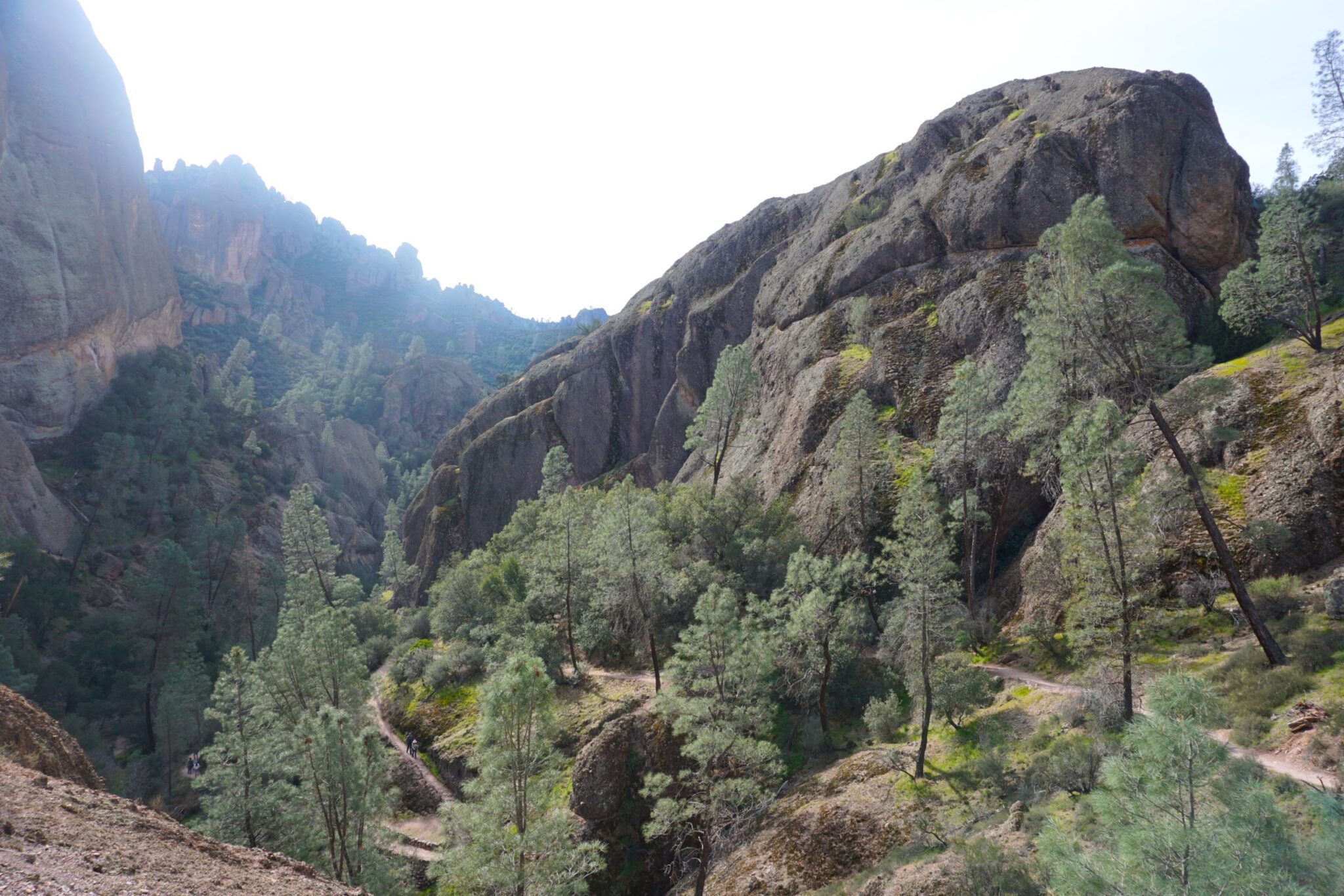
East Entrance Pinnacles National Park
There are 4 hiking options on the east side of the park.
Bear Gulch Cave Trail
Length: 1.5 miles
Elevation gain: 240ft
Difficulty: Easy
Pinnacles Visitor Center to Bear Gulch Day Use Area
Length: 4.6 miles
Elevation gain: 300ft
Difficulty: Moderate
High Peaks-Bear Gulch Loop
Length: 6.7 miles
Elevation gain: 1,425ft
Difficulty: Hard
Chalone Peak
Length: 9 miles
Elevation gain: 1,040ft
Pinnacles National Park Things to Do
Beyond Pinnacles National Park hiking, popular visitor activities include exploring rare talus cave formations, rock climbing, admiring the Pinnacles High Peaks, and bird-watching.
Pinnacles National Park Caves
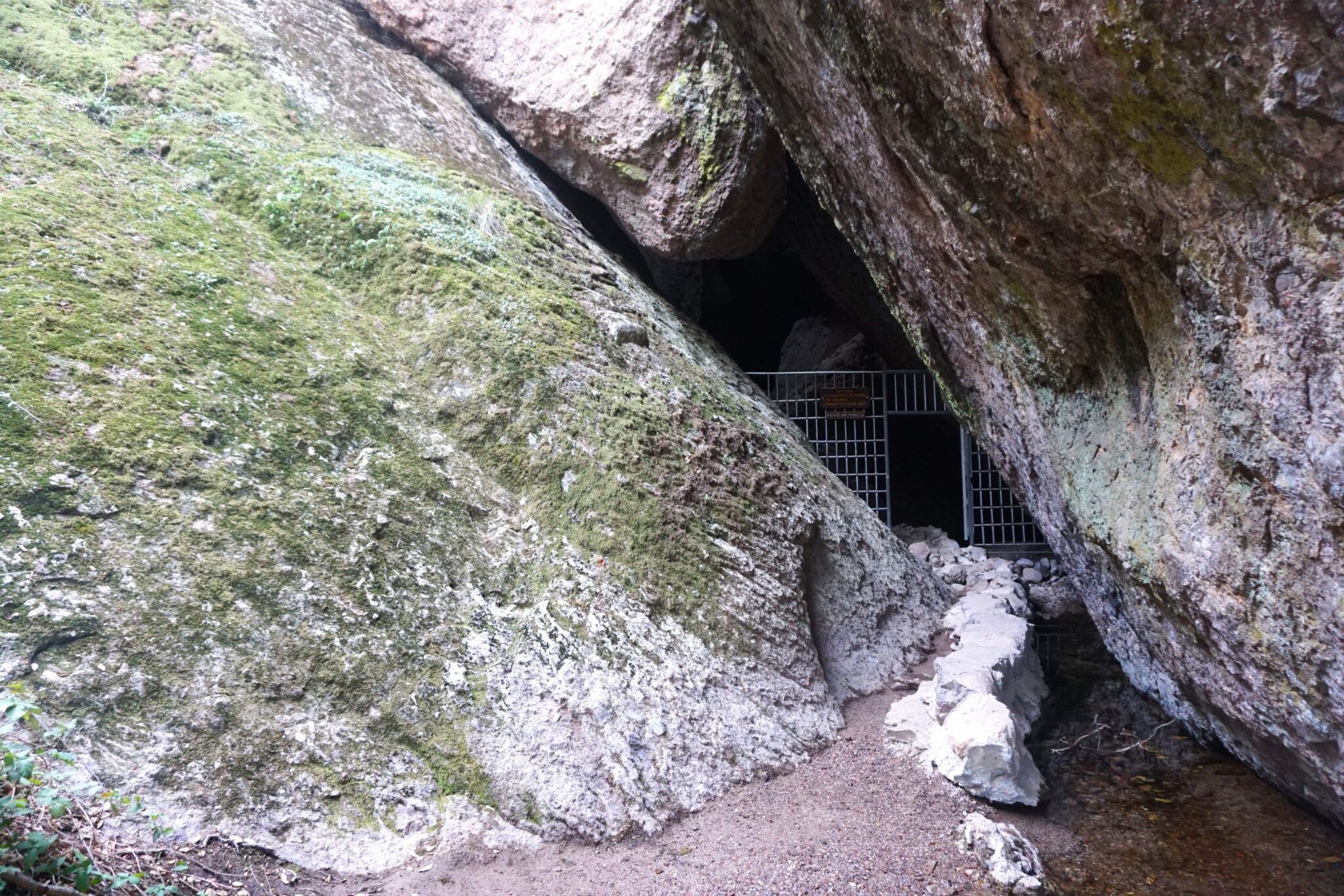
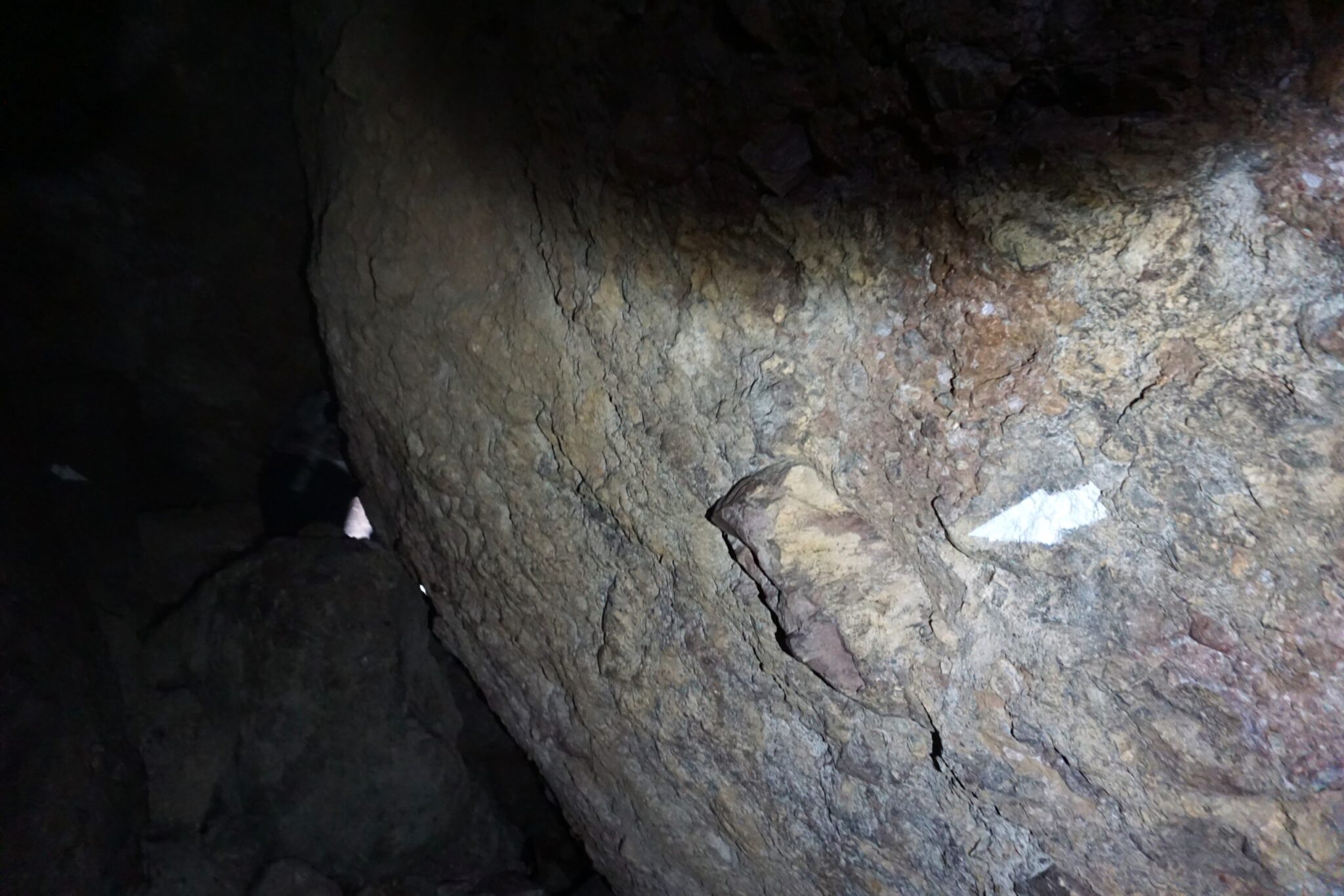
There are two main (and rare!) talus cave formations at Pinnacles: Balconies Cave on the West Entrance, and Bear Gulch Cave on the east. Scramble your way up, down, and around these boulder formations with a headlamp and follow the white painted arrows to make your way out. It’s not that easy- pack that headlamp!
Pinnacles Rock Climbing
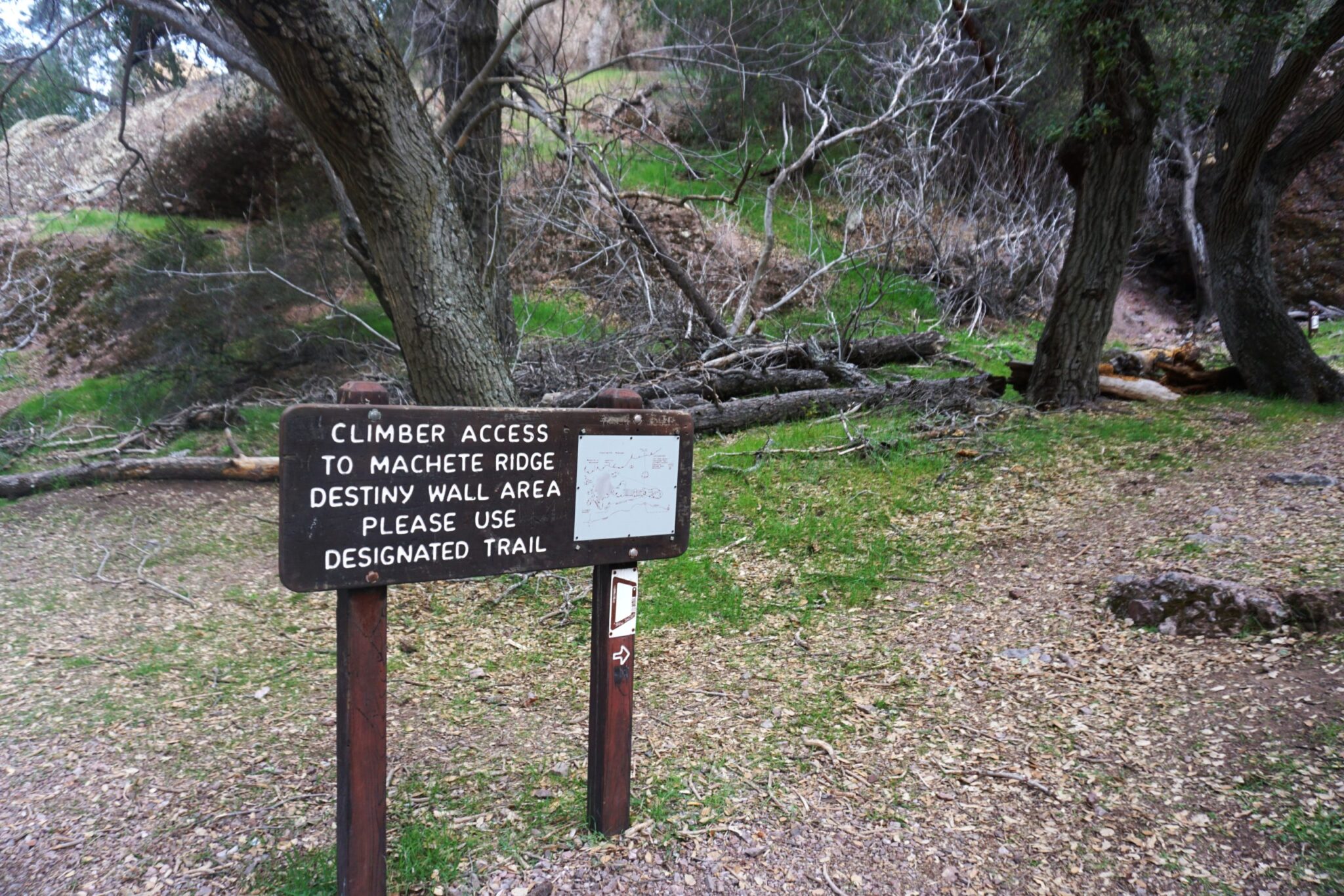
Did you know there are HUNDREDS of climbing routes through both sides of the park?
Volcanic Breccia is the rock formation at Pinnacles, and it is much softer than granite which can be dangerous. It is advised to begin climbing below your level in order to safely acclimate to this type of rock.
Rock on the east side of the park is generally considered safer than on the west, but Pinnacles rock is generally brittle throughout the entire park therefore extreme precaution must be taken. Check climbing safety from the National Park Service before your visit
Camping near Pinnacles National Park
The only campground at Pinnacles National Park is on the east entrance of the park. It is open 365 days a year with no holiday or seasonal closures. The campground is equipped with flush toilets and coin-operated showers.
Tent camping, group campsites, and RV hookups are available at the campsite. Book far in advance if staying on a weekend during high season (mid winter, holiday weekends, and spring).
Hotels Pinnacles National Park
There aren’t many hotels around the corner from Pinnacles itself. There is a reason this is United States’ 7th smallest national park, and it’s kind of in the middle of nowhere! But that’s the reason it’s a hidden charm, so the adventure to find accommodation is just part of the journey.
I stayed in Seaside one hour away, and traveled to Pinnacles for a morning visit.
Closer accommodation options include Inn at the Pinnacles, just under 4 miles away from the national park entrance, and Yanks RV Resort, 11 miles away from Pinnacles National Park.
Things to do near Pinnacles National Park
There are so many incredible day trips from Pinnacles National Park! Or combine Pinnacles with one of these stops for a longer Pacific Coast Highway Road Trip.
Consider taking a drive through Big Sur along Highway 1 with breathtaking stops like Garrapata State Park and McWay Falls. Explore scenic Monterrey and explore California’s shortest road trip, 17 Mile Drive.
Pinnacles National Park Packing List
headlamps to make the most out of your Pinnacles caving experience. It really is a scramble (which is absolutely amazing!) and quite pitch dark. You’ll want your hands free for gripping rocks as you climb your way up or down the cave, so a cellphone flashlight would be my last resort.
Pinnacles National Park Winter
The following additional items should be considered if you are planning a Pinnacles National park winter trip.
Cell Service
I had no cell service at all in the national park. It went down about 20mn away from the park. You can download an offline map, but you really only can go one way straight down the road where you lose service which takes you directly to the park, and can only go straight once you get into the park, so it wouldn’t be a huge deal if you didn’t have this.
High Peaks
Practically what the park is famous for, you can catch the views on a variety of hikes, and do not need to take the High Peaks Balconies Cave Loop 8.4 mile trail. These jagged rocks high in the air provide quite the view, and some intensive narrow hiking as you approach the top.
Pinnacles National Park Packing List
Here are a couple of can’t-miss items to toss in your suitcase when completing the best hikes at Pinnacles National Park:
Trail Shoes– I cannot stress the importance of comfortable shoes with strong traction. Be good to your feet!
First Aid Kit– Safety first. Never know when you’ll need a first aid kit! Always be prepared on the trails. Band-aids, gauze wrap, motion sickness medication, etc.
Water Bottle– Hydration, hydration, hydration! I recommend at least a gallon of water per person for a full hiking day.
Hydration Backpack– Consider packing your water into a Hydration Backpack like a Camelback or similar.. I have found this much less strenuous on my back, and there are still enough side pockets to hold your camera, snacks, and a sandwich.
Packable Backpack– Alternative to a Camelback. Packable backpacks are GREAT because you can roll them up and throw them into a suitcase or carry-on bag, and they take up LITERALLY no room at all. They provide an ample amount of room for one day of adventures.
For the chilly weather…
Base layers– Wear warm clothing under your jacket and pants. Alternatively, consider fleece-lined leggings with a water-resistant exterior.
Puffer jacket– I prefer a puffer jacket to a long parka because this is also packable, and easy to roll up into your backpack if you get hot.
Rain shell– Wear this over your puffer jacket to make sure you stay dry if it snows. The best part is these are lightweight and packable! Weather fluctuates, but your comfort shouldn’t.
Hiking Boots– Comfortable, waterproof hiking boots make all the difference in snowy weather. Keep your feet dry!
